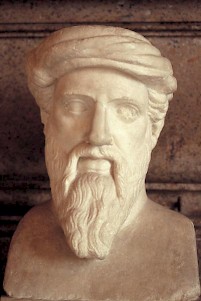Pythagoras
Pythagoras of Samos (c.570-c.495): almost legendary Greek philosopher.

Like his older contemporary Thales of Miletus, Pythagoras of Samos was looking for a first cause, but their approach was different. Thales was thinking of something concrete, water; Pythagoras, on the other hand, believed in a more abstract approach - numerals.
According to legend, Pythagoras left his country and studied with the wise men of Egypt, but was taken captive when the Persian king Cambyses invaded the country of the Nile (525). He now became a student of the Chaldaeans of Babylon and the Magians of Persia. Some even say that he visited the Indian Brahmans, because Pythagoras believed in reincarnation, but this is almost certainly impossible, although he may have met Indian sages at the court of the Persian king Darius I the Great.
At the end of the sixth century, Pythagoras lived in southern Italy, where he founded a community of philosophers. In his view, our world was governed by numbers, and was therefore essentially harmonious. It is very difficult to know more about the philosophy of Pythagoras. The famous Pythagorean theorem is certainly not his invention, as it was known in Egypt and Babylonia at least a millennium earlier.
Literature
A biography was included in the Lives of Eminent Philosophers by Diogenes Laertius (here).